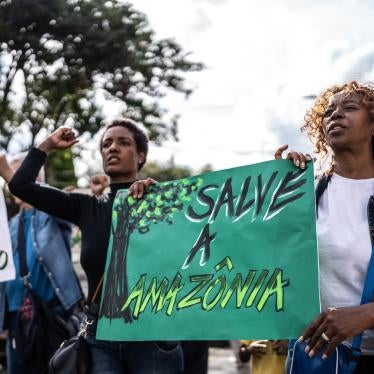To: Solicitor General, Jorge Messias
Cc: President's Chief of Staff, Rui Costa; Minister of Indigenous People, Sonia Guajajara; Minister of Human Rights, Silvio Almeida; National Foundation for Indigenous Peoples (Funai), Joenia Wapichana
To the Solicitor General,
I write on behalf of Human Rights Watch to urge you to withdraw Regulatory Opinion n° 001/2017/GAB/CGU/AGU, adopted by the office of the Solicitor General on July 19, 2017, during the presidency of Michel Temer. As you know, this opinion says that Indigenous peoples cannot obtain legal recognition of their traditional lands if they were not physically present there on October 5, 1988 – the day Brazil’s Constitution was enacted – or if they had not initiated legal proceedings to claim it by that date. The Constitution itself does not contain any article establishing this rule.
Implementing this arbitrary cut-off-date would contravene Brazil’s international human rights obligations.
The United Nations Declaration on the Rights of Indigenous Peoples (UNDRIP), adopted in 2007, states that Indigenous peoples are entitled to the lands, territories, and resources that they have traditionally occupied or used. States should give legal recognition and protection to traditional lands, including those that Indigenous peoples were forced to leave or had otherwise lost.
Brazil supported the adoption of this UN declaration. The government at the time, which was led by current president Luiz Inácio Lula da Silva, described it as “a major achievement, long overdue, that will provide new impetus to and acknowledgement of the efforts of States and indigenous peoples to strengthen the promotion and protection of indigenous peoples’ rights.”
The Inter-American Court of Human Rights has also recognized the right to restitution of land historically owned or occupied by Indigenous peoples. On several occasions –including its rulings on the cases of Moiwana Community v. Suriname, Yakye Axa Indigenous Community v. Paraguay, Sawhoyamaxa Indigenous Community v. Paraguay, and Xákmok Kásek Indigenous Community v. Paraguay between 2005 and 2010– the Court found that Indigenous peoples’ right to their traditional territory persist as long as “the material, cultural, or spiritual connection” with the land persists.
Furthermore, Brazil’s own Constitution recognizes Indigenous people’s right to “the lands they traditionally occupy,” without any time limits or arbitrary cut-off dates, and states that it is incumbent upon the federal government to demarcate Indigenous territories and to protect them.
Demarcation is particularly important to set out clearly what land belongs to Indigenous peoples and to provide them with secure collective legal rights over that land. But the 2017 opinion from the office of the Solicitor General undermines the right of Indigenous peoples to their traditional lands.
Several demarcation requests have been pending for decades in Brazil. The uncertainty over the titling makes Indigenous territories particularly vulnerable to encroachment by people involved in illegal land-grabbing. The cut-off-date aggravates the situation by delaying demarcation even more, as it requires the Indigenous community to prove they were physically there on October 5, 1988, or impeding it altogether – a legal uncertainty that fuels conflicts over the land and violence against Indigenous peoples, according to several Indigenous rights groups.
The administration of former president Jair Bolsonaro used the 2017 opinion effectively to suspend all pending demarcations. In the meantime, illegal logging, mining, poaching, and land seizures in Indigenous territories increased 180 percent in three years, according to the non-profit Indigenist Missionary Council (CIMI), an Indigenous rights advocacy organization that compiles cases of violence against Indigenous people.
As you know, the Supreme Court will rule on a case brought by Santa Catarina state, which is using the cut-off-date argument to oppose recognition of traditional land claimed by the Xokleng Indigenous people. The court has established that its decision in this case will apply to all similar cases. We urge you to revoke the harmful 2017 opinion adopted by the then-Solicitor General as soon as possible and send the Court a new opinion that upholds Indigenous rights, as contemplated in Brazil’s Constitution and international standards supported by the Brazilian government.
In addition to being a fundamental step to uphold Indigenous rights, promoting the demarcation and protection of Indigenous land is also a cornerstone of successful conservation efforts. Recent studies show that forests managed by Indigenous people in the Amazon are strong net carbon sinks and that demarcation and other measures to secure Indigenous lands can slow deforestation. This is key to enable Brazil to meet its commitments under the Paris Agreement to reduce greenhouse gas emissions and domestic policies intended to end deforestation in the Amazon.
Withdrawing the cut-off-date is a necessary step to fulfil Brazil’s international human rights obligations. It’s also paramount at a moment of extreme vulnerability for Indigenous people facing the onslaught of criminal networks engaging in land seizure and environmental destruction that leads to the loss of livelihoods and violence. The recent crisis involving the Yanomami Indigenous people, who have faced malnutrition and diseases amid the encroachment of their lands by thousands of miners, is a stark reminder of the very serious impacts of the government’s failure to protect Indigenous rights.
For all the above mentioned reasons, Human Rights Watch respectfully urges your office to immediately revoke Regulatory Opinion n° 001/2017 and adopt a position that upholds Indigenous rights.
Thank you for your attention to this very important matter.
Sincerely,
Maria Laura Canineu







